#Epicurus Art Print
Photo

Looking for a unique piece of intellectual decor that will inspire your mind and add a touch of vintage philosophy to your home or office? Look no further than this stunning digital portrait of Epicurus, the ancient Greek philosopher and founder of Epicureanism. With its intricate details and timeless style, this Epic
Print
This vintage philosophy print is not only a great conversation starter, but also a perfect gift for students, teachers, or anyone interested in the history of philosophy. It's easy to download and print, making it a convenient and affordable way to add a touch of intellectual elegance to your space. Combine it with other philosophy wall art or use it as a standalone piece, this Epicurus decor will elevate any room.
Order now and receive this beautiful Epicurus digital art print in a matter of minutes. Add it to your cart and enjoy the beauty and wisdom of this Greek philosopher every day.
Etsy Purchase
#Epicurus Wall Decor#Epicurus Digital Art#Epicurus Art Print#Hedonism Art Print#Vintage Philosophy#Epicurus Poster Art#Epicurus Portrait#Intellectual Decor#Philosophy Wall Art#Greek Philosopher#philosophy poster#Epicureanism Poster#Epicurus Decor#Digital Art#Digital Download#Digital Prints#Digital Poster#download and print#Minimal Wall Decor#Minimal Art#Art Sale
1 note
·
View note
Text
First Proposal and Beginning Statement (25th February 2022)
Discuss your current arts-based practice and/ or professional experience.
I am currently influenced by the quasi-philosophical weird fiction works of such authors as Edgar Allan Poe, H.P. Lovecraft, Arthur Machen, Algernon Blackwood, Comte De Lautreamont and Robert Chambers. This then being fused together with such academic influences as George Orwell, Jean Jacques Rousseau, Georges Bataille, Jean Paul Sartre, Epicurus, Friedrich Nietzsche, Emil Cioran, Eugene Thacker and Immanuel Kant. My current research focus is mainly on the progression of Nihilism and the futurist understandings of accelerationism through post-humanist portraiture and horror media. Primarily, I am inspired by the works of Eugene Thacker to read Horror fiction as contemporary philosophy and cultural criticism through allegory as the means. My Identity and practice is the natural result of post-modern society. My art is all about using horror visuals as a timeless allegory for mankind's blights in the face of the unknown and noumena, and how we deal with fear and states beyond our comprehension through portraiture. In particular, when attempting to the represent the troubled social evolution of a world that is always in conflict, and can't face the future and it's awaiting horrors of the post-human.
My style as a post-humanist conceptually, is all about subverting the expected and allowing for question to be more important than objective answers and interpretations. As someone who is clearly about philosophy as a priority in the work, I believe that art like philosophy works best when it looks to the future to prophesise greater questions about us and the other, rather than cancelling the challenging nature of the past, and the existential conflicts of today, with contrived, objective and dismissive answers. This sense of bringing out the significance of literary/ philosophical influences into my contemporary portraitist style, originates from my own personal lifelong journey affirming myself as a LaVeyanist. I have written about the aforementioned subjects within each of my MA submissions and will continue to do so with this module too.
I do have some professional experience working with Eastside projects and have put on one small group show a year before Covid hit the scene, until now I have found it challenging to take my work to a professional level due to all the restrictions and the lack of experience I have showing my work professionally in publications and installations, though I am now applying for shows and and prizes to push myself out before maybe later attempted a Phd after this course is through.
Method of Log (Blog/Vlog/Digital Platform/ Physical/Journal/Sketchbook):
A blog on Tumblr (Currently not started on but the page is set up) :
https://www.tumblr.com/blog/deoffal-mp-adm7000-n-s1-2022
You are also required to submit and develop a reflective log of your research processes. Please outline how employability/professional context will inform your future plans and how this is going to be embedded into your Major Project submission.
Due to my previously discussed plans and opportunities outside of my studies involving certain prizes and exhibitions that I am currently and have already applied for, my only The role of my religion is crucial when attempting to understand my approaches, I was once someone who was disassociated with analogue/ printed media and the importance of conserving and teaching the values of historical and contemporary philosophical exploration in my earlier education. Over a decade later, and I am wanting to champion the importance of proper literary education within my work, as an artist who is fuelled and endlessly fascinated by the continued need for printed academic resources, to hopefully too fuel the greater generation after me, in spite of internet obsession and generally homogenised cultural stagnancy.
0 notes
Text
Epicure - Hannigram Fic
I wrote a fic. Also posted to AO3. Set post-S3.
According to the philosophy of Epicurus, fear of death is at the root of human neuroses and one should strive for a life that is peaceful because of the freedom from fear.
Hannibal is struggling to keep his thoughts together after the fall, taking care of his incapacitated lover while slowly succumbing to the ravages of his own wounds. The surrounding silence of winter is full of imaginings he would rather put to rest.
------------------------------
Silverware polish spots the tabletop, soaking into the wood in places where the dark varnish is peeling. Hannibal draws a fingernail along the wood grain and it comes up tacky. He rubs the residue away between his fingertips, face impassive but inwardly frowning. Seventeen spoons, lined up like fallen soldiers along the edge of the table, reflect back his profile in the dim light. The polish hasn’t quite managed to take off all the patina, and each pitted and discolored silver round seems to say, “beggars can’t be choosers.” Hannibal scrubs the last spoon with an oil-dirtied handkerchief.
It is close to 4 PM. The windows in the cramped kitchen are smudged with age and rimed with frost. The falling snow outside dims the setting winter sun into a pale silver coin, giving the old house a ghostly submarine glow. In the downstairs hallway, the grandfather clock tick-tocks slightly out of time, sounding strangely muffled. Hannibal pushes his thumb into the curve of the spoon. His hands smell like polish now; the whole kitchen does. The rest of him smells like sweat and blood and antiseptic, masking the unpleasantly sweet stink of infection. He closes his eyes. The spoons are part of one reality. When he opens his eyes, he is part of another.
Florence. Standing on the Ponte Vecchio, listening to the vendors hawk their art and jewelry, imagining the smell of the butcher shops that originally lined the bridge, stewing in the perfume and body odor of the tourists. Closed in on either side by the storefronts, cold in a winter breeze, face lit warmly by reflected firelight from wrought-iron lanterns. Looking out over the water at the graceful arches of the Ponte Santa Trinita. Remembering a rough little dog waiting for handouts at his feet. Remembering a craving for Chianina beef and human liver and fresh olive oil. Imagining the feeling of slim and strong hands on his waist. Imagining the taste in his throat of aftershave with a ship on the bottle.
Will cries out from the bedroom. Hannibal rises from the table, folding the handkerchief. Eighteen spoons on the table’s edge like uniformed corpses. He hears Taps ringing in some other life as he walks away from them.
(cont.)
“Tutto bene,” Hannibal says in the bedroom, smoothing his hand along Will’s fevered brow, pushing his wet bangs away from his pale and beautiful face. Saintlike in the firelight, Will rests with his head back, throat bared, eyelids flickering with nightmares. So exquisite. St. Francis of Assisi in ecstasy, or St. Sebastian. He bears the wounds on his body grandly; they are red in the yellow light. The hollows of his bones and his ruined cheek are heavily shadowed, Carravaggian, painted delicately with a thick brush. Hannibal runs a hand over Will’s cheek, his jaw, that throat. He closes his fingers around the pulse point and leans in close. When he can’t find his English, he murmurs in Italian. Precious. Mine. Sometimes, you brought this on yourself. But Hannibal can’t summon any anger. He bathes his Will with cold water and meditates on the nature of love and how it’s taken almost everything from him.
Some days are better than others.
There’s no television in this house, but Hannibal has a radio. He carries it around with him when he’s working. He listens to NPR and staticky strains of opera as he changes the oil in the truck. It has been many years since the last time he had to do this, but he hasn’t forgotten how. He forgets very little, even the things that are better forgotten. He sings along to E lucevan le stelle under his breath, perfectly pitched but voice cracking with disuse. He was never a singer. That doesn’t matter to his audience of air and snow. He taps his fingers along the truck’s hood, pressing phantom harpsichord keys, until it’s too cold to stay outside.
Hannibal chops firewood with an axe half-dulled by weather, but the blows are rhythmic and soothing. Not so long ago, he used an axe to fell a glorious red dragon. What he’s doing now bears little resemblance to how he imagined the life of a knight triumphant, but he minds the spoons: beggars simply cannot be choosers. He’s been through worse; he lived for three years in his mind, waiting for his foolish heart. He bends to pick up the split logs and falls to a knee. The pain is startling still, sometimes, and the twist of the gunshot wound in his stomach knocks the breath out of him. He doesn’t make a sound. He has been through much worse.
Mischa watches him from behind the wood pile with her big, dark eyes. Her little hands rest like snowflakes wherever they fall. The wide, open fields around Hannibal seem to close in on all sides, dizzyingly, like the rooms in Mischa’s dollhouse. She smiles at him. After a long moment, soaked with snow, he struggles to his feet and goes inside. She isn’t real.
Will talks in his sleep frequently, making querulous pleas for succor or calling names that don’t mean anything to Hannibal. He doesn’t share the bed anymore. It’s hardly wide enough for one of them to begin with, and Hannibal doesn’t need another elbow to the stomach. He almost killed Will for that – knife to that beautiful throat, shaking and sweating in a haze of pain and sleep. What a waste that would have been. He still feels sick remembering it now.
He stays in the chair at Will’s bedside and dozes. He delegates himself to watching over. Will requires a lot of attention. They’re running out of medicine. Hannibal starts breaking the painkillers in half, then he stops taking them himself altogether. It’s better when Will sleeps through the night.
Hannibal doesn’t sleep much. He walks the streets of Florence, visiting the Duomo in his mind, visiting the Pazzi family chapel, researching Dante and Sforza and Graham. Other memories intrude. He lets the fever find him in his weaker moments when his hands tremble from wiping pus away from his sutures. A curious physical reaction for a surgeon; so his brain narrates to him as he looks through his cowardly fingers at the angry red lines. They flicker in his vision like the dying fire in the grate. He doesn’t ever look too long or he sees faces inside the flames, some he recognizes.
It starts to snow and it doesn’t stop for days. The wet flakes gather quickly in drifts and make the world silent. Hannibal keeps the doorways clear with a yellow plastic shovel as best he can, but if he stops and sleeps for an hour, then the snow starts to get too heavy to lift without seeing stars. He washes Will’s body and feeds him broken pills and drinks a truly terrible bottle of wine that was left by the previous occupants of the house. He swirls the liquid around and takes in the bouquet out of habit, but it doesn’t help. Notes of vinegar, and they aren’t subtle.
A black dog comes on the third day of snow. Hannibal sees it out of the corner of his eye from the attic window. The shadowed lupine shape stands out against the fields like an inkblot devouring paper, an absence of light. Blankets smelling of mothballs slip from Hannibal’s (coward) hands when he sees it. Ice crowds his gullet. “Perkūnas.” It’s the name of an old, old god he remembers from childhood stories. It’s the name of a black dog. He goes downstairs to make sure that Will is still breathing. He can’t tell if the howling he hears is coming from the dog, the wind, or himself.
Will stirs in his nightmares and gasps Hannibal’s name. Hannibal kisses his forehead and holds his hand through the long night, fingers intertwined.
Oh, what would he say if his ever-rational father could see him now?
It doesn’t really matter now. His father’s brains were eaten by wolves. He dreams about them steaming in the snow on a night like tonight, jellylike and pink with blood, and the smell of burning metal and rubber, and the smell of gunpowder and death. He is grateful, when he wakes, that the acrid taste of vomit banishes the imagined texture of grey matter on his tongue.
Hannibal knows he’s seeing things. He sees the wolves in the trees at twilight, disappearing between the pines, disguised by the heavy branches mounded with snow. Ghosts in the long night. He sees tracks at the doors, circling the house. Each toeprint tipped by a claw mark. And then there are the boot prints, too. It varies from hour to hour whether he thinks they belong to the FBI or to the Hilfswillige. The thought that either one has found them fills him with a desperate sense of purpose; he stands in front of Will’s bed with a knife in hand, watching the doorway for hours. He knows no one is coming in. Physician, heal thyself. The shadows still feel like monsters even when he knows they cannot be.
He sees the black dog again. Outside, it walks with Mischa, stalking her steps. She moves with childish grace, plays like violins between the drifts. The strings are dogged by French horns. Petya i volk. Notes spill from his mind into the waking world. Hannibal wants to go to her, to lift her from the snow, to feel her tiny, star-shaped hands on his face. Her hair is long and curling in her face. Her smile is like the sun. He reminds himself often that the pain in his arm is from his fall into the sea, not from reaching after her and having the barn door slammed closed on him.
She disappears when he rushes outside to her, stumbling without shoes. Down to his knees again in the snow. She isn’t real. The sun is fading from the world. Look inside the belly of the wolf and find it swallowed alive.
In the evening (some evening, what day is it) Hannibal runs hot water over his wound, looking into the ugly, puckering skin, shivering and sopping up the pus. It’s very cold. Has he brought in enough firewood? Breathing is a labor and his mouth is dry, like he’s sucking on wool. He reminds himself that he’s been through worse and lies back down on the floor. (This is getting to be pretty bad.)
Maybe the dog is here for him?
He never thinks about what comes after. He thinks about his earliest memory and projects forward to what he imagines will be the moment of his death. He didn’t imagine he would be dying of a septic gunshot wound, laid out on greying tile in a borrowed bathroom. Something more glamorous would have suited him better. An aneurysm at the height of a crescendo. Being crushed to death under a crystal chandelier. Or, indeed, falling from a cliff with his darkened and debauched lover in an unwitting murder-suicide.
But they lived. They lived to decline. Hannibal feels tears wetting his face. He doesn’t want to go yet. He finally has what he wants. He closes his eyes. Some time passes in darkness and the sound of surf, no, the sound of the river Arno washing against the Ponte Vecchio. Prokofiev playing. Salt smell of prosciutto, olive oil. Someone is touching his cheek.
“Mischa?”
“Shh,” says Will. “I’m here.”
---
Will is half-silhouetted against the bedroom window, hair long and falling into his face. He’s very thin, swimming in a sweater pulled from one of the room’s dressers, but his eyes are clear. His cheek isn’t healing very nicely, but at least it’s healing. Hannibal tries to reach for Will, but his arm won’t move. Broken by the barn door? He’s struck by the thought that this is a dream, that all of this has been a dream he created in the white, geometric interior of his cell at Baltimore State Hospital for the Criminally Insane - maybe he’s finally, actually gone insane? Then Will is there, gently freeing his hand from the heavy bedclothes and taking it between his palms.
“Hey,” Will says, attempting a smile. The scar pulls at his lips. The warmth in his gaze is genuine. “You’re back.”
“Dove sono andato?” Hannibal asks, or thinks he asks. Where did I go? Will tilts his head, and after a moment Hannibal realizes he didn’t understand. His mind roves over letters and words, picking them up and putting them down like seashells collected from a stormy shore. By the time he finds the right ones, he’s forgotten what he wanted to say. It doesn’t matter; Will has leaned down to kiss him softly. Their mouths meet for the first time, and a feeling rises in Hannibal’s chest, a warmth, a pressure that settles in his throat. He takes Will’s wrist in a tight grip. “Non lasciarmi,” he says, curses his fumbling tongue, but the meaning this time seems clear. Will rests their foreheads together.
"I’m staying, Hannibal.” Will squeezes his hand. “This time we’ll be together.”
Some days are better than others.
Hannibal doesn’t enjoy taking over the role of “the bedridden.” He doesn’t enjoy the weakness in his limbs or the ache of his unused muscles. He sleeps, struggles, sleeps again. He sicks up ill-gotten antibiotics and oversalted chicken broth patronizingly spoon-fed to him by a frustratingly patient Will. There are long afternoons when he can do nothing but listen to the fire or the radio, alone. He chafes in the emptiness, resents his dependence. The Florence in his mind is full of unintended associations now, and he hides from them elsewhere, poring over medical texts in the Eisenhower Library at Johns Hopkins or listening to the Goldberg Variations playing endlessly on loop at the Bach House in Eisenach. He dreams of Mischa often, but he doesn’t see her anymore, and this is a kindness.
He sees the black dog again. After days of recumbency, missing Will, he’s pulls himself up, finally, from the confines of the bedroom and is determined to sit in the kitchen. At least it will be a change of scenery. He can take in the silver sunlight and polish the spoons. He can advise Will on how to make a proper bowl of soup, with silkie, red dates, and goji berries; it will fall on deaf ears, he’s sure, and anyway, all the food they have is in cans. Still, he can’t abide the idea of eating like this forever. Will will have to learn to cook. Hannibal crosses the den, one hand on the wall for support, tracing the faded flower pattern of the dated wallpaper. And there’s the dog, sitting in the kitchen doorway, forelimbs stretched out before it like Tutankhamun’s Anubis Shrine.
Hannibal must make some sound (of fear, potentially, though he prefers to think dismay) because Will comes down the stairs at speed, somewhat dusty and trailing an extension cord.
“Hey, it’s okay,” he says, “It’s okay.” He touches Hannibal’s shoulder, then goes to the dog, half-crouching, to take it by the scruff. “I found her outside. Good girl. This is Hannibal. See? She’s really friendly!” He half-smiles up at Hannibal with a note of pleading in his voice. “I thought we could keep her.” His eyes look very blue today in the silver winter light.
Hannibal swears under his breath in Russian like the stable hands used to. They have no room for a dog in this house. There might be space enough, but the corners are crowded with fears and doubt, the threat of capture lurks under the windows, the future flees through every crack. They can barely feed themselves from what they have. And every time Hannibal looks at the dog, he sees death waiting for them. He doesn’t say that part out loud – cannot. It’s the spiraling clamor of his dying mind; it’s a thought that should be discarded. He looks at the dog and he looks away.
Will makes a show of listening very seriously to his concerns – the ones that make sense, the ones Hannibal can give voice to – his blue eyes wide and attentive. He doesn’t say anything. As Hannibal starts to wind down, tone going ever so slightly bitter, Will rests his chin on the dog’s head. All innocence, all charm. He will never belong fully to Hannibal.
“Her name is Sadie.”
Will, Hannibal, and the dog stay in the house until Hannibal can stay up for the whole day, carry a backpack, bear the close touch of a jacket over his stomach. Until there are no more instances of lost words or confusing nights when Hannibal forgets where he is and tells Will to bar the door against looters and worse. They don’t talk about that. Instead, they talk about leaving. It turns out that Will has found an old computer in the attic, stashed away under a worn pile of clothes, and he’s been fixing it up in the between hours. With a little bit of elbow grease and the unintended generosity of unknown neighbors with an unsecured wireless signal, they have internet access.
It feels strange to broach the outside world again. The submarine atmosphere of the old house pops like a bubble full of smoke and spills them into the resumption of time.
News sites are still talking about them, some more vociferously than others. They were tracked to the cliffside by dogs and crime scene analysis, but vanished altogether thereafter. Freddie Lounds has pitched a daring helicopter escape to Cuba. They’ll be going north, then. Jack appears suddenly on CNN in a three-minute feature segment and scares them both, like a specter bursting suddenly from a darkened closet. Jack doesn’t think they’re dead, and they’re not, and they shouldn’t linger.
“Time to go,” Will says, after they’ve packed up the truck. The back seat is full of all their scavenged wealth: the blankets and clothes and cans and the last of the medicines, all they can fit and find use for. Sadie sits in the footwell, resting her chin on the center console and slowly wagging her tail. Will gets into the driver’s seat. “Where to?”
The sun is setting and the trees are casting wide nets of shadow over the fields in front of them. The interior of the cabin smells like cracked leather, old smoke, and the ghost of a pine-shaped air freshener. Will smells like soap and healthy sweat and mothballs. Hannibal kisses his jaw. All they have is now. All they have is each other, a truck, and an ominous black dog.
“Wherever you want to go, beloved.”
#Hannibal#Hannigram#hannibal lecter#will graham#mischa lecter#my fic#sickfic#whump#injury and recovery
47 notes
·
View notes
Text
Good Stuff’s Best of 2018
WARNING: I just want to say cheers to you for making it through another year. I send you best wishes for next year to be fruitful. Thank you, take care out there, and enjoy.
Dedicated to Stan Lee, Stefán Karl and Stephen Hillenburg, the number ones of children entertainment
Bow Whacka Wow, playas and players. 2018 gave us quite a lot to consume while society continues to fumble like a Tumblr update. While hopefully the chaos has died down for the final weeks of the year, I’m counting down the best cartoons/animations I’ve seen and loved this year in no particular order. Only two rules, no sneak previews of future projects (sorry 101 Dalmatian Street and MP100) and no potential entries from last year’s list (sorry True). With that said, roll it....
10. UNIKITTY!

I love the Lego Movie. I’ll potentially like the sequel. I like Unikitty. She got a show, and it was a great show to start off the year. Upbeat, colorful, off the walls sometimes, perfectly capturing the spirit of the eponymous character. I’m glad the other characters are just as enjoyable, I never get tired of the theme song, every episode had me smilin’ one way or another, it’s just a quality bottle of positivity juice. Don’t know how else to explain it, Unikitty, the show and character, just makes and continues to make me smile.
9. POP TEA-- SIKE!
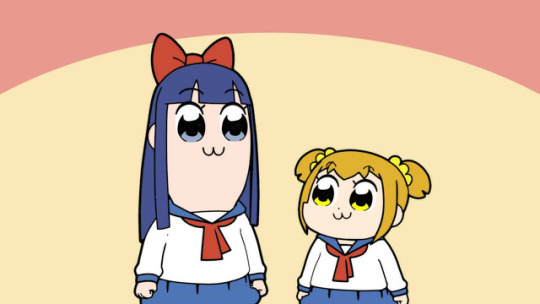
This anime ain’t nothing but unfunny randomness and skits with a forgetful arc in the first and final episode. I don’t get it, never gonna get it, so I don’t want to get it! MORE LIKE POOP TEAM EPIC, ‘nuff said. Which is why the actual number nine is....
9. BOB EPIC TEAM
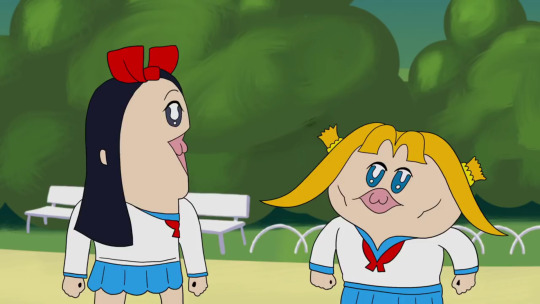
Honestly, there is something endearing about the way Bob Epic Team presents itself. The simplicity and variety of its animation is remarkably good and makes it feel timeless sometimes. The comedy works in a way that gives you a clear grasp on the two characters while letting them do whatever they want. The surrealism of this is fun to think about, showcasing a hedonistic philosophy that rivals that of Epicurus. The duo’s chemistry is what especially got me, as they felt like the best of friends, potentially love birds *wink wink*. This anime was just creative in every sense of the word and, like Unikitty, it was a great anime to start of the year.
8. CRAIG OF THE CREEK
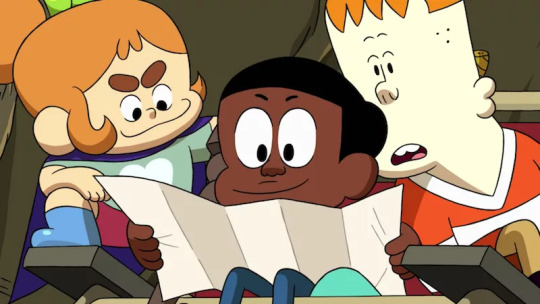
The ska is RAH. I honestly find this to be the loose spiritual successor to Hey Arnold and Recess. Like the playground, the creek is a well fleshed out setting with the many characters that hang there, from the TAZ trio to the loving witches of the creek. Though I will say the best episodes are when we get insight on the main three’s personal lives with their families and when the characters themselves go through a personal trial to understand themselves a little better. The shows thrives in the theme that the creek is a place where you can enjoy getting your hands dirty and work towards something you want, even if it doesn’t add to any concrete long term benefit beyond learning a thing or two about yourself and others. And I say for somebody that relates to Craig as a character, that’s a welcoming thought that the show has yet to perish. And the ska is a welcome choice of music, IMO.
7. THE EPIC TALES OF CAPTAIN UNDERPANTS
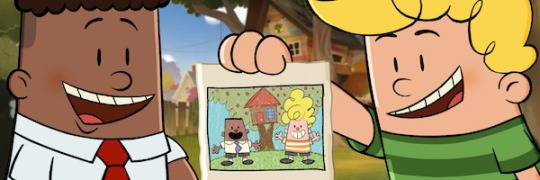
It’s funny in how a little over a year of getting a movie, Captain Underpants gets an animated series with not only original stories in lieu of just animating the already printed stories, but puts it all in a format similar to reading a book with a sardonic narrator and separating the plot of the episode into chapters with subtitle cards; one of the first I’ve seen do this. But really, a “Captain Underpants cartoon” is something I can’t say would turn out bad, and I’m right as this is a show that revels in what made CU great in the first place. George, Harold, Melvin, and Mr. Krupp/Captain Underpants are all great characters with the additional supporting cast providing welcome life to the world. Every Incredible Violence Chapter is brilliant in their own right, and while I wasn’t a fan of the ending they had for the season, it’s great that almost every episode is self-contained, boosting its replay value. Honestly, any compliment I have for this was already said in my review of this and the movie, so I’ll just say this too was faithful to its source material and benefited heavily for it.
6. GARY AND HIS DEMONS

Rick and Morty done better. BOOM, send tweet! It is safe to say that this was quite the sleeper hit and I can’t help but say it’s lowkey one of the best adult cartoons this year next to Ballmastrz and Final Space. And while I certainly appreciate the other two *hint hint* this one got a step above on the grounds that it works as a comedy and a solemn tale of a chosen hero that stumbles through years in the office life. It’s improv humor feels natural and it can be as melancholic as Bojack Horseman without making it all too deep like so; has a great balance of both. Main man Gary, unlike Rick for the most part, is a guy that’s both reasonably reprehensible yet pretty relatable. Not to mention, while it was bittersweet, it had a very satisfying finale to where I feel like this was a complete series all together. With a rough art style that compliments it’s tone, this was a series that surprised me in its sharp quality.
5. APPLE & ONION
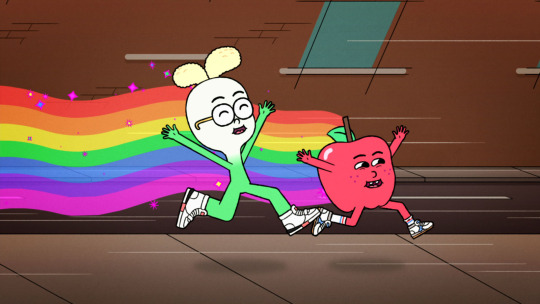
I’ll admit. Initially wasn’t a fan of it as it felt like a knock-off to Regular Show (may it rest). Just had a duo of bros living together, doing mundane labor while coming up with impromptu tunes along the way. Then again, I was gladly proven wrong because the charm of it generally being a simple show, even with every person being food, somehow more regular than Regular Show. Every song they make is upbeat and catchy, all of the characters are endearing, and with only 10 episodes, each one was well paced and had quality writing to the point where I teared up a couple times. It stinks that this and Summer Camp Island have generally been receiving the shaft this year after their premieres, but I'm just glad that they haven’t been truly forgotten by CN and are getting more episodes next year. Plus, I love food and this show is about food. Debate over.
4. LEGEND OF THE THREE CABALLEROS
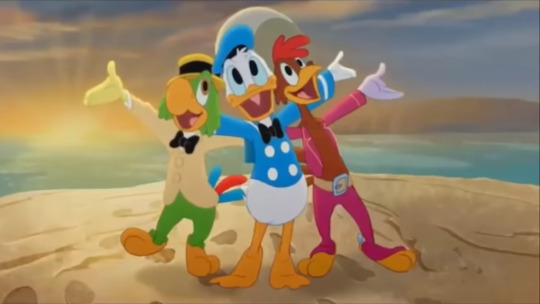
I was familiar yet never saw The Three Caballeros, ironic since Donald is one of my favorite Disney characters. But then, out of the blue, I found this and I was stunned, amazed, confused, nonetheless invested. It has a bumpy start, but it’s a joyous adventure from that start to end. The look of it is something I’ve rarely seen in animation since... freakin’ Wakfu. I love Xandra and I was glad to see her be an active player on the team. The villains are such a hammy delight. And Jose and Panchito were very lively and entertaining foils to Donald’s cynic nature while all three work as well together like the 3 stooges. Donald himself gets a great arc of his own throughout the season. And the theme, HO MY GOD I LOVE THIS THEME! It’s a damn shame Disney hasn’t released this already (since it’s all online already) because this series is much better than it has any right to be.
3. GOLDEN WIND/VENTO AUREO

I say, the beauty of Jojo’s Bizarre Adventure is that regardless of what part you start from, you’re enthralled into its world and ya feel compelled to dig into it more. Parts 3 was what got me into Jojo, like most I bet, but it was part 5 that got me “Oh yeah, this series [just] works on more than level”. The characters are what keep me hooked, regardless of Crunchyroll refusing to give their stands proper English names [Zipper Man, CR?], Fighting Gold and Freak ‘n You will never get old, and David Productions putting great effort into the small details and giving life and style to the original manga. I’ll just say, as one who’s read and loved the manga, this anime has not ceased to keep me impressed and guessing for more.
2. INTO THE SPIDER-VERSE

Funking superb, you afro having web-slinger. I hate to say it, but 2018 didn’t have the most impressive line-up of western animated features. Most were average, entertaining sure, but nothing felt like 110% was given. Until Spidah-Man came on the scene and I was like “WIG...
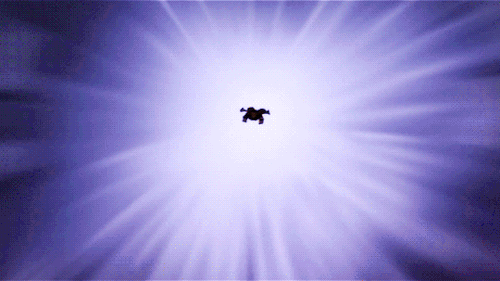
The only major problem I have with this film, besides a bit of slow pacing, is more of a missed opportunity where the stakes of getting the Spidermen back to their dimensions before dying felt like an afterthought. Then again, that’s ALL I have for problems. It looks fantastic. The action is smooth, coherent, and satisfying to see. The tiny details and comic book aesthetic of it was a blessed touch. I loved almost every character here. Nick Cage and John Mulaney. The fact that it has so much yet was able to juggle it all blew my mind. Even the post credits scene made this such a love letter to the wall-crawler. This film was refreshing to say the least and the central theme behind the idea of Spider-Man made this as great of a superhero movie as Infinity War and Lego Batman. Just saying, this better make its budget back and THEN SOME. It deserves it.
1. HILDA
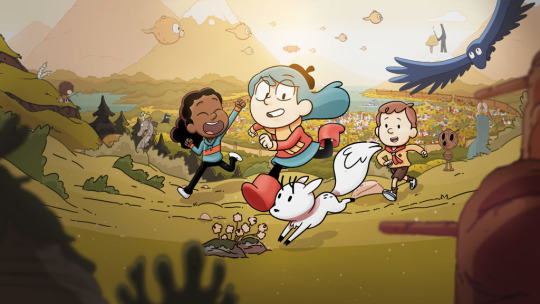
Netflix, we’re not on good terms mind you, but ya done did it again. This is honestly one of the few shows that I genuinely took my time with as opposed to binging it, because binge watching is a devil in itself. Like the Spider-verse movie, it got the style of its source material down to cozy colored T with its autumn color palette and etched lining in the characters. Like the Captain Underpants series, while having a grounded arc of Hilda journeying through the city life and her colliding wildlife, each episode can be generally be enjoyed on their own. Like Gary and His Demons, it felt like a complete season and the fact it’s getting a season two made things all the better. But above all, it was a generally peaceful yet captivating fantasy cartoon to watch with incredible animation, an endearing main character, amazing looking folk creatures of all sizes and powers, and a cuddly deerfox for a pet. I say this is to the fall what Harvey Beaks was to the spring, and if I can compare a show to Harvey Beaks you know you’ve achieved greatness. Like True and the Rainbow Kingdom, gives you a moment of honest bliss and happiness that can influence your outlook on looking forward to better things because like Hilda herself, you push forward and have some fun exploring.
Just saying, I cannot stress this enough this is NOT my number one favorite show of the year, hell of all time. THAT goes to....
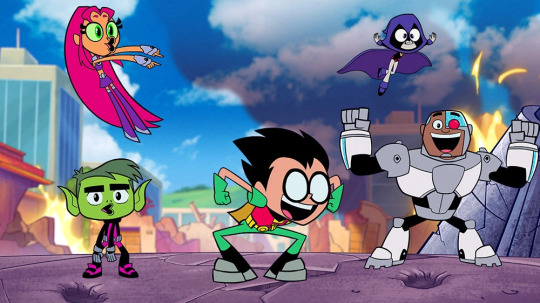
1. 👏TEEN 👏TITANS 👏GO, BABEEEEEEY!!
ONCE AGAIN, Teen Titans GO reigns supre-- Huh, what’s that? Oh my god, you’re serious?! The Number One is

TOTAL DRAMARAMA OUT OF NOWHERE! IT IS NOW CARTOON NETWORK’S ‘NEW FAVORITE SHOW’.

THE STREAK *DING DING DING* IS OVER
#best of 2018#cartoons#anime#animation#Good Stuff#cartoon network#disney#reviews#long post#unikitty#pop team epic#bob epic team#cotc#craig of the creek#the epic tales of captain underpants#captain underpants#gary and his demons#apple and onion#legend of the three caballeros#the three cabarellos#into the spider verse#golden wind#vento aureo#Hilda#hilda the series#hildafolk#TTG#total dramarama#awesome#ye
411 notes
·
View notes
Photo
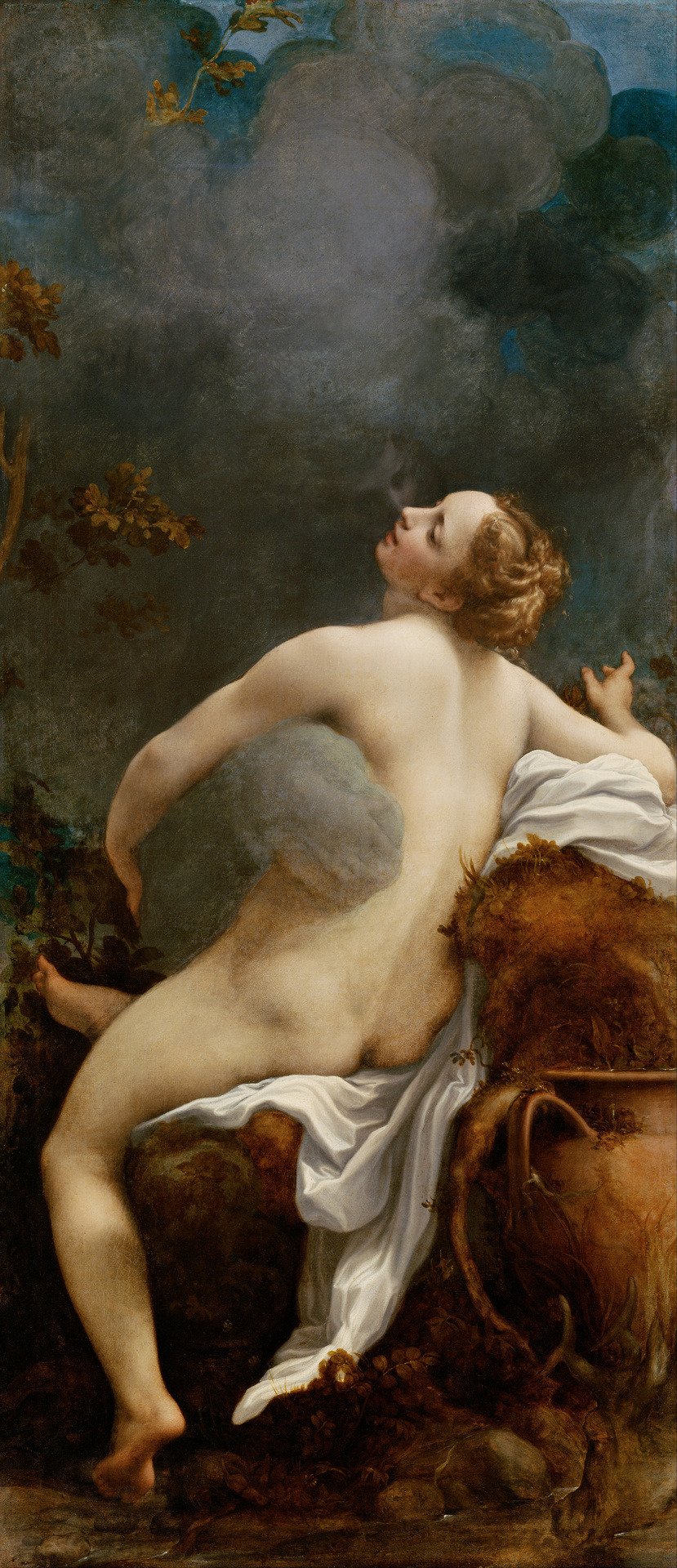
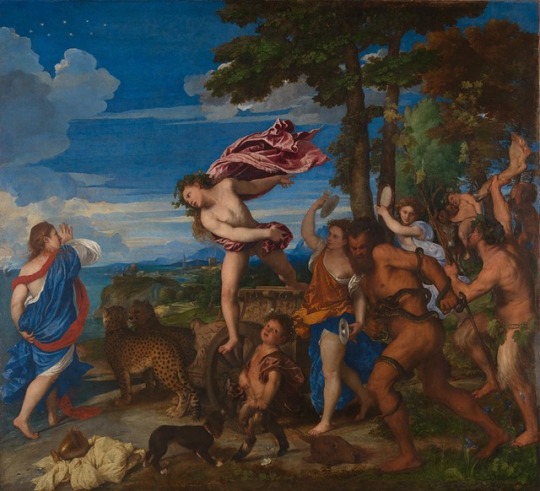
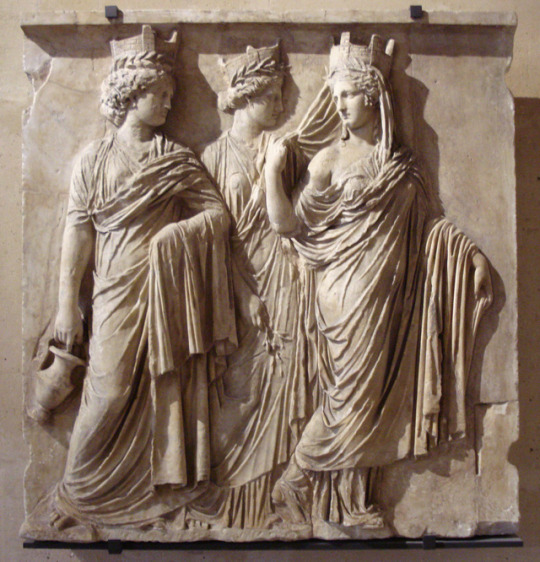
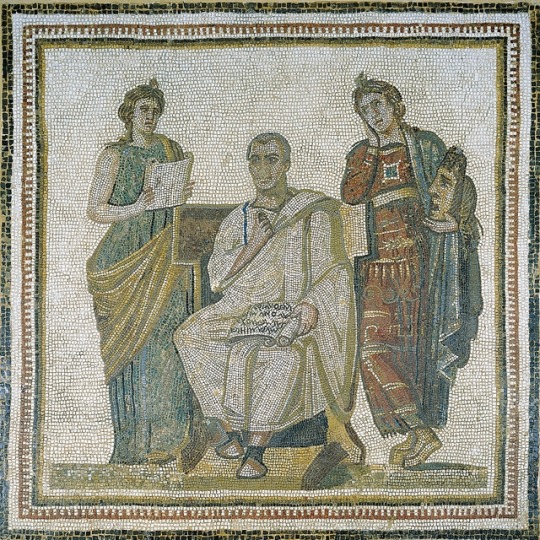

By Jean Marie Carey
Publius Vergilius Maro – better known as the Roman poet Virgil – was born 15 October 70 BCE. The Aeneid, considered the national epic poem of Rome from the time it was written until today, was created between 29 and 19 BCE and tells of the legendary Aeneas, a Trojan who travelled to Italy, where he became the ancestor of the Romans. Modelled to some extent on the Iliad, the first six of the poem's twelve books tell the story of Aeneas's wanderings from Troy to Italy, and the poem's second half tells of the Trojans' ultimately victorious war upon the Latins, under whose name Aeneas and his Trojan followers are destined to be subsumed.
In addition to its narrative teleology, the Aeneid provides many of the “back stories” of the deities of the Roman pantheon which persisted as popular stories after belief in the Olympians had ceased as a religious practice. “Fate” as a central concept coincides with the will of Jupiter, though the exact relationship is kept vague. Juno, pained and angry at past events, attempts always to retard the progress of the story, as a sort of "counter‐fate.” She is doomed to failure; at the end of the epic she is reconciled to the fate of Aeneas, but we know that this is only temporary. Onto the opposition between the king and queen of heaven may be projected many other oppositions in the poem: heaven and hell, order and disorder, reason and emotion, success and failure, future and past, epic and tragedy. The treatment of these oppositions became a central subject for Renaissance artists and writers who recast the conflicts in contemporary Christian allegories and metaphors.
Coincidentally 15 October is also the birthday of another famous Roman poet, Titus Lucretius Carus (94–55 BCE), a writer and philosopher whose only known work, De rerum natura, is at once a masterpiece of Latin literature and also the chief conduit through which the philosophy of Epicurus was transmitted to Renaissance Italy and beyond. Despite the widespead unease about Lucretius being one of the few ancient writers whose doctrines seemed to be in direct conflict with Christianity, the poem, which encourages virtuous living, continued to be read throughout the period, and was an important influence on the thought of cosmologists, philosophers, writers, and book lovers, including Aldus Manutius, who printed a version in 1500.
Reference: "Lucretius in the Renaissance." In The Oxford Dictionary of the Renaissance, edited by Campbell Gordon. Oxford: Oxford University Press, 2003. http://www.oxfordreference.com/view/10.1093/acref/9780198601753.001.0001/acref-9780198601753-e-2247 and “Virgil,” in Oxford Dictionary of the Classical World, Oxford University Press, 2007. http://www.oxfordreference.com/view/10.1093/acref/9780192801463.001.0001/acref-9780192801463-e-2329.
Correggio. Jupiter and Io, c. 1530. Google Art Project.
Titian. Bacchus and Ariadne, c. 1520. The National Gallery
Clio, Virgil and Melpomene. Imperial Roman, c. 200. The Bardo Museum, Tunis.
As três Tyches, c. 160. The Borghese Collection at the Louvre, Paris. Photo: Ricardo André Frantz.
Sandro Botticelli. Primavera, c. 1475. Uffizi Gallery, Florence.
Further Reading: Philip Hardie. The Last Trojan Hero, A Cultural History of Virgil's Aeneid. London: I.B.Tauris, 2014.
Virgil. The Aeneid. Translated by David Ferry. Chicago: The University of Chicago Press, 2017.
#otd#rome#virgil#lucretius#clio#melpomene#sandro botticelli#titian#correggio#roman mythology#the aeneid#troy#ancient rome#bachhus#ariadne#primavera#jupiter and io#epic poems#latin literature
92 notes
·
View notes
Text
The Problem of Evil / Final Paper
The Problem of Evil
Final Paper Assignment by Sariah Rose Peckham
Philosophy 1010
2017
I have chosen to dissect the philosophical problem of evil and its given implications. For a large portion of society, the belief in God has always been reverently debated while also remaining as a strongly upheld religious ideology for centuries. One might argue that the question, “Does God exist?” holds the title for the most examined question and debate the world has ever had to morally deal with. To quote David Hume, “Epicurus’s old questions are yet unanswered. Is he willing to prevent evil, but not able? Then he is impotent. Is he able, but not willing? Then he is malevolent. Is he both able and willing? Whence then is evil?” [1] Here, Hume adequately summarizes the conflict that the problem of evil produces. This is the most powerful argument that gives society reason to believe that God does not exist. I am going to provide two solutions that I have researched to help bring closure to the problem of evil.
A simple Google search for ‘God’ defines: “(in Christianity and other monotheistic religions) the creator and ruler of the universe and source of all moral authority; the Supreme Being. Human evil is suffering caused by humans acting in a way that is considered morally wrong (rape, murder) while natural evil is suffering caused by events that have nothing to do with humans – i.e., earthquakes, tornadoes. [2] If we exist in a world that offers such harm, how can God allow these threats to continuously happen? If God is omnipotent, then wouldn’t he have had the power to stop Hurricane Katrina? If God is omniscient, shouldn’t he know how to prevent suffering? If God is omnibenevolent, that would mean is he is all-loving or infinitely good. Why would God allow bad things to happen to good people? This seems contradictory.
Peter Kreeft, an American Philosopher, has four parts to his solution that rallies for the existence of God and solving the problem of evil. Kreeft states, “The unbeliever who asks that question is usually feeling resentment toward and rebellion against God, not just lacking evidence for his existence.” [3] He elaborates to quite a depth, but essentially the four parts are as such. (1) Evil is not a thing, but a wrong choice. (2) The all-powerful God gave us a share in his power to choose freely. (3) The Cross is God’s part of the practical solution to evil. Our part is to repent, to believe, and to work with God in fighting evil by the power of love. (4) The phrase, “Why do bad things happen to good people?” makes assumptions. Who is to say we are good people? Who is to say suffering is bad?
I am trying to keep an open mind as Kreeft considers these fundamental parts of Catholicism and Christianity. Overall, if you share this belief, his reasoning is sound. I find it totally difficult to accept as you would have to believe you are on this earth to repent for God. That you are “here” because someone gave you the will to be. I think there can be adverse reactions to this belief.
From American philosopher William Lane Craig, “When one says ‘solved’ one means ‘philosophically resolved’”. He references an admission explored by Alvin Plantinga, another well-known American philosopher that resolves with, “As the Christian sees things, and God does not stand idly by, coolly observing the suffering of His creatures. He enters into and shares our suffering. He endures the anguish of seeing his son, the second person of the Trinity, consigned to the bitterly cruel and shameful death of the cross. Some theologians claim that God cannot suffer. I believe they are wrong. God's capacity for suffering, I believe, is proportional to his greatness; it exceeds our capacity for suffering in the same measure as his capacity for knowledge exceeds ours. Christ was prepared to endure the agonies of hell itself; and God, the Lord of the universe, was prepared to endure the suffering consequent upon his son's humiliation and death. He was prepared to accept this suffering in order to overcome sin, and death, and the evils that afflict our world, and to confer on us a life more glorious that we can imagine. So we don't know why God permits evil; we do know, however, that He was prepared to suffer on our behalf, to accept suffering of which we can form no conception.” [4] So basically, God created the universe and has permitted this evil and has a good reason for doing so. This would mean there is no contradiction in theism. This definitely puts things into a different perspective that I found very fascinating. From what I understood, the evil is justified because God has endured it already. The question then changes to how can God be justified to us in this world, but how we can be justified to God.
There are of course many other conflicts with the problem of evil. William S. Hatcher would say it is logical to deny altogether that evil exists – therefore an all-knowing, all-powerful God is plausible. [5] C.S. Lewis, well known author, has the idea that evil is a necessary good, therefore God can exist too. [6] Everyone seems to have complications with everyone else’s ideologies. I have found there are always holes to one’s thought process, no matter which way you try to configure it. It’s a complex problem that everyone seems to think that they have a simple solution to. I have found this isn’t the case but at least I have been given the chance to reflect on other perspectives as well as my own.
Bibliography
David Hume, Dialogues concerning Natural Religion, ed. with an Introduction by Norman Kemp Smith (Indianapolis: Bobbs-Merrill, 1980), Part X, p.198.
BBC - GCSE Bitesize: The two types of evil." BBC News. BBC, 2014. Web. 27 Apr. 2017.
Kreeft, Peter. Fundamentals of the Faith. 1st ed. N.p.: Ignatius Press, 1988. Print
Craig, William L. "The Problem of Evil | Reasonable Faith." ReasonableFaith.org. N.p., n.d. Web. 27 Apr. 2017. <http://www.reasonablefaith.org/the-problem-of-evil>.
Hatcher, William S. God and the Problem of Evil . 1st ed. N.p.: Blackwell, 2001. Print.
Lindsley, Art. The Problem of Evil. C.S Lewis Institute, 2003. Journal.
2 notes
·
View notes
Photo

5.0 out of 5 stars
Comprehensive Exhibition, Comprehensive Book
5.0 out of 5 stars
The ethos of the Hellenistic Kingdoms feels uncannily contemporary
The particpatory political culture of the Greek cities states had been destroyed. The conquests of Alexander left his bickering successor tyrants awash in looted gold. Aristotle is superseded by Epicurus and Antithenes ( the sculpted portraits of all three philosophers make there appearance here) . Both Cynicism and Epicureanism are doctrines of social disengagement created in a brutal world threatened by maraudering outsiders and defended by plutocratic elites unafraid to show of their wealth and power in exuberant propandistic displays of monumental sculpture, gold, bronze, and even halucenegenically colored glass. The dramatic sexual ambiguities inherent in some of the most evocative sculptures ring true to our own sensibilties. The bronze bust (with incised life- like eyes) of the "the worried man from Delos" mirrors are own collective insecurities about the future balance of power... Gone are Classical restraint. This is an age of excessive anxiety that created a profusion of intricately wrought objects for both domestic and public display to dispel the gathering gloom as one by one the Hellenistic kingdoms fell before the advancing might of Rome, whose cultural hegemony would copy and continue both the monumental and intimate artistic traditions so magnificently displayed in their amazing variety shown here: from miniature intaglio gems to massive temple fronts. Between Alexander and Augustus, the Hellenistic age, like our own, was a time of uncertainty and violence that created enduring monuments. These three turbulent centuries are displayed in one of the most scholarly and sumptuously produced tomes ever printed by the Metropolitan Museum of Art. As we turn the pages we cannot but help but sense our deep kinship to these vanished kingdoms. Go to Amazon
5.0 out of 5 stars
I am not a great fan of Greek Art
Catalogue of an exhibit at The Metropolitan Museum of Art. Artifacts from Pergamon in Turkey, by way of the Pergamon Museum in Berlin. The Pergamon is undergoing renovation, so it allowed many of the pieces featured here to travel to New York (and New York only). I am not a great fan of Greek Art, but the exhibition and book are great. Go to Amazon
5.0 out of 5 stars
This wonderful and beautiful catalog replicates the vastly inspired exhibition just ...
This wonderful and beautiful catalog replicates the vastly inspired exhibition just finished at the Metropolitan Museum. The essays are absolutely wonderful, by informed, balanced and insightful curators and other scholars. Everything about this catalog replicates the richness and beauty of the exhibition itself, without the physical weariness of actually going through the show. This catalog is full of great pix and wonderful essays. I hope to visit Pergamon some day. While perhaps one third of the pieces on display are from Berlin, I wonder why we cannot create a location with all of the pierces available for viewing in perpetuity. I understand the difficulties. Now that the exhibition is closed, buy this magnificent catalog! Go to Amazon
5.0 out of 5 stars
Well worthwhile for images and text both
Beautifully illustrated and well written book. Takes one in-depth toward a great understanding of Pergamon and the Hellenistic Kingdoms' art. Go to Amazon
0 notes